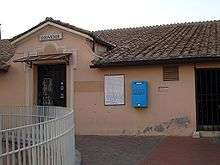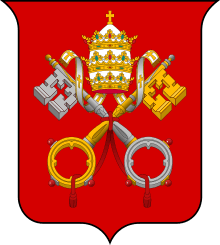Economy of Vatican City
| Currency | Euro (EUR) |
|---|---|
| Calendar year | |
| Statistics | |
| GDP | n/av |
Labour force | 4,822 (2016) |
Labour force by occupation | note: essentially services with a small amount of industry; nearly all dignitaries, priests, nuns, guards, and the approximately 3,000 lay workers live outside the Vatican |
Main industries | printing, production of coins, medals, postage stamps, mosaics and staff uniforms and financial services |
| Public finances | |
| Revenues | $315 million (2013) |
| Expenses | $334 million (2013) |
| Economic aid | Peter's Pence |

A souvenir shop on the roof of St. Peter's Basilica
The unique, noncommercial economy of Vatican City is supported financially by contributions (known as Peter's Pence) from Roman Catholics throughout the world, the sale of postage stamps and tourist mementos, fees for admission to museums,[1] and the sale of publications.
Key statistics
Budget:
- revenues: $315 million (2013)
- expenditures: $348 million (2013) [2]
- Industries
Printing and production of a small amount of mosaics and staff uniforms; worldwide banking and financial activities
- Electricity – production
442 MWh (2010) from solar panels.
- Electricity – imports
Electricity supplied by Italy.
- Currency
Euro (since 2002). Vatican City depends on Italy for practical production of banknotes, stamps and other valuable titles. Owing to their rarity, Vatican euro coins are sought by collectors.
The fiscal year is the Calendar year.
See also
Notes
- ↑ "Italy suspends Vatican bank card payments". 3 January 2013 – via www.bbc.co.uk.
- ↑ Europe :: Holy See (Vatican City). CIA – The World Factbook. Cia.gov. Retrieved on August 1, 2017.
References
 This article incorporates public domain material from the CIA World Factbook document "2010 edition".
This article incorporates public domain material from the CIA World Factbook document "2010 edition".
This article is issued from
Wikipedia.
The text is licensed under Creative Commons - Attribution - Sharealike.
Additional terms may apply for the media files.

